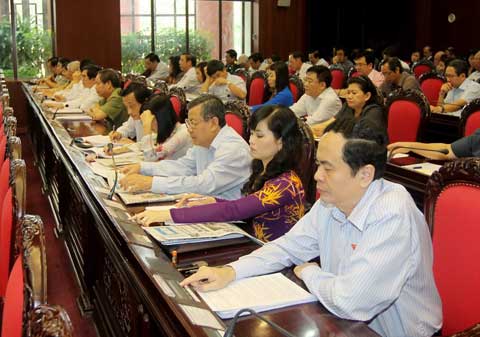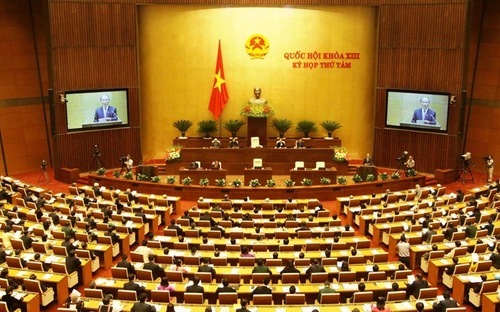On November 23, 2012, the Law amending and supplementing a number of articles of the Law on Anti-Corruption was passed by the 13th National Assembly and took effect from February 1, 2013. Many contents were amended and supplemented to enhance transparency and openness in the activities of the State apparatus.
Regulations on the responsibility to explain the origin of additional assets of individuals obliged to declare assets
According to the Law on Amending and Supplementing a Number of Articles of the Anti-Corruption Law, upon request, competent State authorities must explain their decisions and actions in performing their assigned duties and powers before the authorities, organizations, and individuals whose lawful rights and interests are directly affected by such decisions or actions.
The asset declaration of individuals obliged to declare must be made public within the agency, organization, or unit where the individual frequently works.
Authorized persons managing officials and public employees decide on the form of publication, either by announcing at meetings or posting the declaration at the workplace of the agency, organization, or unit. The publication time is from January 1 to March 31 every year. If published by posting, the minimum duration must be 30 consecutive days.
The asset declaration of candidates for the National Assembly and People's Council must be made public at the voter conference where the candidate works. The timing and form of publication are implemented according to the regulations of the Election Council. The asset declaration of individuals proposed for election, approval at the National Assembly, or People's Council must be made public to the National Assembly or People's Council delegates at the session. The timing and form of publication are implemented following the regulations of the Standing Committee of the National Assembly and the Standing Committee of the People's Council.
Individuals obliged to declare assets must explain the origin of the additional assets. The Government of Vietnam regulates the value threshold of additional assets and the determination of additional asset values, the authority to request explanations, the responsibility of the person explaining, and the procedure and process for explanation.
The basis for asset verification includes when there are accusations of dishonesty in the asset declaration of individuals obliged to declare; when it is deemed necessary to have additional information for elections, appointments, dismissals, removals, or discipline of individuals obliged to declare assets; when there is reason to believe that the explanation of the origin of additional assets is unreasonable; and when requested by authorized agencies, organizations, or individuals.

Transparency in management of investment construction projects
Reports on pre-feasibility, feasibility, assessments of socio-economic impacts; objectives, projected results, main activities, and beneficiaries in the project formulation process; project approval decisions, and implementation plans; progress reports, performance reports, assessment reports, and project completion reports must be transparent and made public.
No closed internal equitization in State-owned enterprises
In managing investment construction projects, the Amended Law stipulates that reports on pre-feasibility, feasibility, socio-economic impact assessments; objectives, projected results, main activities, and beneficiaries in the project formulation process; approval decisions, and implementation plans; progress reports, performance reports, assessment reports, and project completion reports must be publicly transparent.
State-owned enterprises are responsible for disclosing: the state’s investment capital and assets in the enterprise; capital and assets of the enterprise invested in subsidiaries and associated companies; off-core business investments; preferential loans; financial and audit reports; equitization plans and schemes; the establishment and use of enterprise funds; appointments of leadership positions; names, duties, salaries, and other incomes of members of the members' council, board of directors, general director, deputy general directors, directors, deputy directors, controllers, and chief accountants.
The equitization of State-owned enterprises must be transparent and public; it must not be internally closed within the enterprise. The agency appointing representatives of the State’s capital in the enterprise is responsible for publicizing the value of the equitized enterprise and adjustments to the enterprise value (if any).
Transparent compensation, support, and resettlement levels when land is acquired
The amended, supplemented Anti-Corruption Law stipulates transparency in the land domain. Planning and land use plans must be public and transparent. During the planning and adjustment process, the drafting agency or organization must publicly inform the local populace of the planning, land use plans, land acquisition, site clearance, compensation levels, support, and resettlement upon land acquisition after the competent State authorities decide, approve, or adjust. Additionally, procedures, authority, and the issuance of land use right certificates; detailed planning and plotting of homestead land, the subjects granted land for housing; financial contributions to the state budget from land management and use, and land levy exemptions, and reductions must be publicly transparent.
For agriculture and rural development: The law requires publicity and transparency of agricultural, forestry, and fisheries support policies and programs; forest development plans; conditions, procedures for forest allocation, leasing, recovery, and changing forest use purposes, and forest use right registration; procedures, authority, and the granting and revoking of licenses for the business of plant protection drugs, veterinary drugs, agricultural, forest, and seafood exploitation and processing.
Transparency in implementing ethnic policies: Criteria and standards of beneficiaries, level of benefits; procedures, authority for implementing ethnic policies in areas of difficult and specially difficult ethnic minorities; the implementation of programs and projects in difficult and specially difficult ethnic minority areas; reporting on the results of implementing ethnic policies...
The amended and supplemented law clearly stipulates that if there is no legal provision on the form of disclosure, the head of the agency, organization, or unit must perform one or several of the following forms of disclosure: Posting at the workplace; informing in writing to related agencies, organizations, units, and individuals; publishing; announcing on mass media; and posting on the electronic information portal. Additionally, the head of the agency, organization, or unit may choose to publish at meetings of the agency, organization, unit, and provide information upon the request of the agency, organization, or individual.
Source: Central Internal Affairs Committee
 Article table of contents
Article table of contents





.Medium.png)
.Medium.png)
.Medium.png)
.Medium.png)
